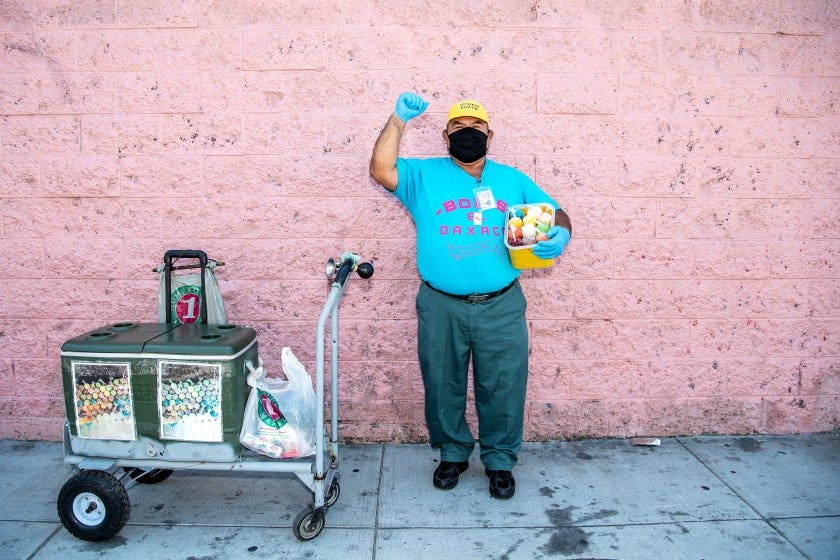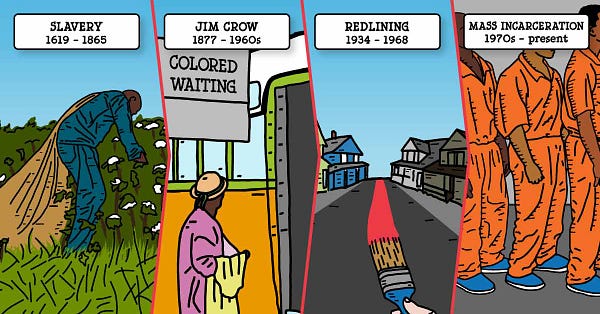Reopening plans are leaving out street vendors
Issue 163: In Los Angeles, restaurants can now use public sidewalks to reopen. But what about street vendors who were there before the pandemic?

Hello! Welcome to Nosh Box, a lunchtime-ish food newsletter that loves a good street taco.
Read yesterday’s dispatch: Can modern milkmen (and women!) fight food waste?
Restaurants in Los Angeles were allowed to reopen last Friday night, Eater LA reported, if they were approved under the new LA Al Fresco guidelines. This program grants restaurants a free immediate variance to use public spaces, like sidewalks and parking lots, to seat customers while social distancing. Dining rooms are limited to 60% capacity and restaurants still have to adhere to public health ordinances, but they can use outdoor space for paying customers.
So here’s a question: What about street vendors, who were booted by the City Council due to the pandemic?
LA’s street vendors — many of whom are undocumented immigrants, refugees, seniors, women of color, or all of the above — only make around $10,000 a year on average and often struggle to navigate the city’s complex and expensive permit application process. And though vending is all but banned during Covid-19, many aren’t eligible for unemployment or government stimulus payments due to their citizenship status. So as restaurants are reopening on street vendors’ turf, these sellers are still being held back.

Faustino Martinez, the operator of Bolis El Oaxaco in South L.A. Photo via L.A. Times.
A couple months ago, in response to Covid-19, the LA City Council effectively banned street vending by telling police to crack down on unlicensed vendors — problematic, since fewer than 400 of LA County’s 40,000ish vendors (food and non-food) have been able to obtain the right permits.
Largely, this isn’t their fault. At Eater LA, Farley Elliot explains the contentious history of LA street vending — and how institutional roadblocks are preventing vendors from getting permits:
Los Angeles’s history with street vending is, in large part, a history of racist anti-vendor propaganda, of criminalization and police enforcement, and of leaving tens of thousands of Angelenos in the murk — predominantly women of color — with no clearly accessible path towards obtaining a sought-after vending permit after all these years. Even after then-governor Jerry Brown legalized street vending statewide in 2018, followed by local legalization and licensing, plenty of vendors today describe an archaic system beset with challenges. Many continue to be given conflicting information on things as simple as where to apply, how to apply, and even the size and shape of the carts they’ll be able to use.
Whereas restaurants will be able to apply for LA Al Fresco outdoor dining variances for free, licensing fees for street vendors typically cost upwards of $500, and fines for unlicensed sellers can run from $250 up to $1,000 per citation, Elliot reports.
Nithya Raman, an urban planner and LA City Council candidate, argues that street vendors have been not just forgotten during Covid-19 but actively pushed away. In an essay for Eater LA, she shared some ideas for how street vending could have actually improved the city’s pandemic response:
Ironically, street vending could be one of the safer food service options available in a pandemic; meals being served outside allows for more room for customers to spread out. What if the city spent more resources on making street vending safe than on making vendors afraid? What if, as it has for every other food service business, the city implemented social distancing rules for street vendors? What if the city allowed vendors access to food that was intended for sporting events that will never happen — food that could be served to low-income people but instead is now rotting in distribution centers? What if the city even loosened vending regulations to allow more micro-businesses to pop up, injecting life into the local economy as so many larger businesses fail?

In other food-related news, Ben and Jerry’s continues to be the best at not just making ice cream but also, like, general existence:




Now if you’ll excuse me, I have a pint of Ben and Jerry’s Half Baked in my freezer that will make an excellent lunch-dessert. See you tomorrow!


